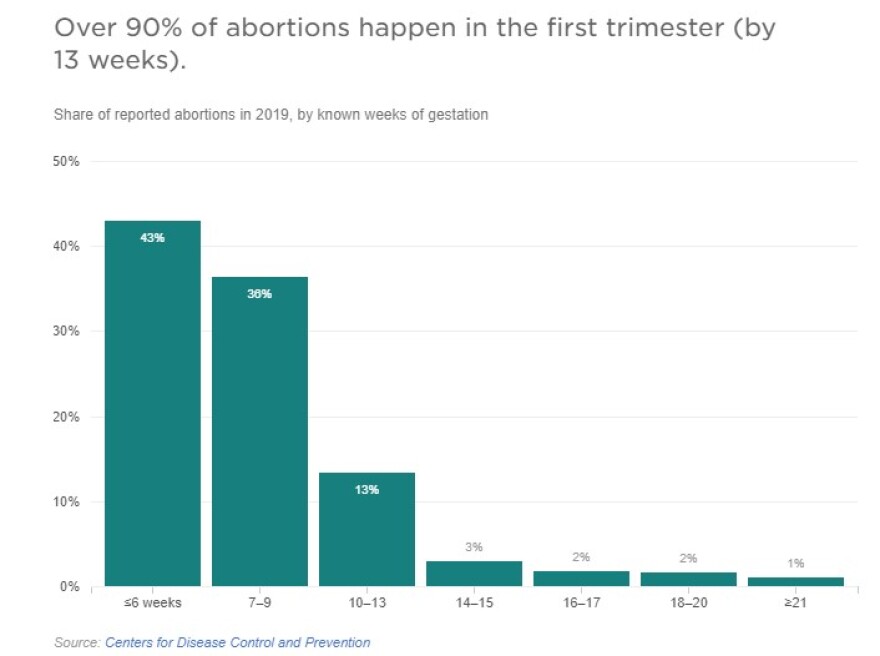The U.S. Supreme Court overturned Roe v. Wade, leaving abortion laws to the states.
In North Carolina, abortion is actually illegal in all cases. However, an exception in the law, passed in 1973 shortly after Roe, allows for abortions until 20 weeks gestation. Because this exception passed the legislature and was signed into law it "makes our law clearer than in many states," says Maxine Eichner, a UNC School of Law professor. It also means it would almost certainly require the legislature to pass - and the governor to sign into law - any changes that would restrict abortions before 20 weeks.
The 1973 law allowed abortions after 20 weeks in cases of "medical emergency." In 2015, the legislature applied a stricter definition to medical emergency, which was signed into law by then-Governor Pat McCrory. That law was challenged in the lawsuit Bryant v. Woodall and ruled unconstitutional by a federal judge based on Roe. Now with Roe overturned, that ruling is in question. WUNC digs into those questions:
Who is affected by this law?
Very few people. Regardless of what happens in Bryant v. Woodall, abortions will still be legal in North Carolina until 20 weeks. The only way to change that, would be for the North Carolina Legislature to pass a new bill, and for the governor to sign that bill into law. Governor Cooper has made clear he would veto any bill that restricts abortion access.
In North Carolina, as in other states, 99% of abortions occur before 20 weeks gestation, according to data from the Centers for Disease Control and Prevention.

What is the history of abortion laws in North Carolina?
In 1881, the state criminalized abortion in the state in all cases. In 1973, that law was amended to carve out an exception that allowed abortions until 20 weeks gestation, and after 20 weeks in case of "a medical emergency." In 2015, the legislature more strictly codified a medical emergency to be defined in part as: A "substantial risk that the continuance of the pregnancy would threaten the life or gravely impair the health of the woman." This 2015 amendment prompted a challenge by abortion providers in Bryant v. Woodall.
Note: While abortions were illegal in all cases until 1973, they were rarely - if ever - prosecuted.
What happened in that case?
The case was heard in United States District Court for the Middle District of North Carolina. Judge William Osteen, citing Roe v. Wade, agreed with the abortion providers and enjoined that part of the law. This does not mean he erased the law. Instead, it meant the law could not be enforced, however, it remains on the books in North Carolina.
With Roe overturned, does it automatically reverse Judge Osteen's decision to enjoin the North Carolina law?
No. Certain groups could petition Judge Osteen to reconsider his decision, given that Roe has been overturned. This could be the N.C. Attorney General's office, as it is the lawyer's office that represents North Carolinians. The Republican-led legislature has asked Attorney General Josh Stein to do exactly that.
Stein's office has said it would respond to the legislature by this week. However, even if he declines to petition Judge Osteen, it's possible the legislature could pursue the move on its own. In a different ruling last week, the U.S. Supreme Court allowed the North Carolina legislature to hire outside counsel to represent it in a gerrymandering challenge. It seems reasonable the court would also allow the legislature to hire outside counsel in the abortion case, or any other case, as well.
If the case goes before Judge Osteen, how would he rule?
While nothing is certain, he would likely reverse his decision. Much of his ruling was based on Roe v. Wade. With that now overturned, he would likely be duty bound to reverse his decision.
Is that the only way Judge Osteen's ruling could be overturned?
No. It's possible a local district attorney could prosecute a provider for performing an abortion after 20 weeks gestation, but before fetal viability. If this were to happen, the provider could argue that Osteen's ruling still applies. But the district attorney could argue it no longer applies because the Supreme Court overturned Roe. It would then be tried in court, and likely appealed.
This scenario seems less likely, given that the Republican legislature has signaled it wants to move quickly to restrict abortion access in North Carolina.







